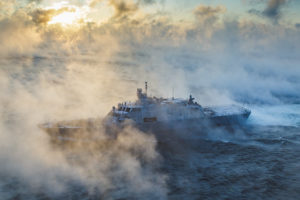A Navy official last week said the service and Lockheed Martin [LMT] are still negotiating the cost sharing to fix the combining gear problem on the
Freedom-variant Littoral Combat Ships.
“Not a whole lot has changed since [Rear] Adm. [Casey] Moton held a roundtable with all of you. We’re still in negotiations with Lockheed Martin, but it goes back to the base requirements of the contract and we are going to take everything under the contract that we have as remedy and this has been a very serious problem and we want to make sure that we work with industry to hold to the terms of the contract,” Capt. Andy Gold, program manager for the LCS program, PMS-501, told reporters during the annual Surface Navy Association symposium on Jan. 11.
In November, Navy’s program executive officer for unmanned and small combatants, Rear Adm. Casey Moton, told reporters during a roundtable call that the Navy and Lockheed Martin are splitting repair costs 50-50 (Defense Daily, Nov. 18, 2021).
Moton said this means any overrun on the normal shipbuilding contract is an overrun where the Navy and industry each pay 50 percent.
“That is not unique to LCS. Many of our shipbuilding contracts are the same construct. Under the latent defect provision, the financial responsibility for a latent defect reverts to the same contract as was used for the shipbuilding. That’s where the 50-50 comes from that we are pursuing…with Lockheed Martin for the fix itself,” Moton said at the time.
Lockheed Martin is the prime contractor for the odd-numbered Freedom-variant program while Fincantieri Marinette Marine built the vessels in Marinette, Wis. The even-numbered Independence-variant LCSs are built by Austal USA at the company’s Mobile, Ala. shipyard.
Last January, the Navy stopped accepting delivery of the Freedom-variant LCSs due to a material defect in the combining gear and said the service said it would only resume deliveries once a fix was installed and tested after land-based testing (Defense Daily, Jan. 22, 2021).
Combining gear original manufacturer RENK AG conducted a root cause analysis after the defect was detected on the future USS Minneapolis-St. Paul (LCS-21) that found two bearings on the high-speed clutch were deficient for the load and the Navy changed the design from ball bearings to journal bearings.
This engine setup meant the Freedom-variant could use either gas turbine engines, independent diesel engines, or both, for power, and use both to reach higher speeds. With the issue detected, affected in-service LCSs have reduced maximum speed to minimize stress on the high-speed clutch.

Gold noted the Navy and its industry partners have conducted extensive testing at RENK in Germany and at-sea testing for several hours at different power levels on LCS-21 and LCS-23, “and everything has checked out, all of the post inspections have proven that the design fix works.”
He said now the Navy is in the process of rolling the fix into new ship construction.
“We’re just starting here in the new year on [USS St. Louis (LCS-19)] which is down in Mayport doing a [Post-Shakedown Availability], so we’re installing the combining gear fix there. Up in the build yard we already have a built-in with the gears that were delivered to [future USS Cleveland (LCS-31)], so that’s off the shelf and then every ship between LCS-23 and 31 will have it installed as we go through the production line,” Gold said.
“And then we’re continuing negotiations with Lockheed Martin on the in-service ships and we’ll continue working on that,” he added.
Last August, a Navy official said deployed ships may have to wait years to receive their combining gear fix (Defense Daily, Aug. 3, 2021).
Gold noted even though the Navy and Lockheed Martin are still working on the negotiation terms the service is working with the company to prepare to fix the next ship in line due for the combining gear change, LCS-19.
“We’re working on it right now. So even as the negotiations go on, we already have folks – we’ve already started on the good work down on LCS-19, so we’re not holding up at all.”
Gold did not disclose the cost range for the combining gear fix, but said contracts are based off of risk and cost and the type of contract. The main contract types are “ all tied to how much risk there might be with the uncertainty regarding execution of the contract. So our industry partners, if there’s a ton of risk, are going to build that all in to the contract.”
He said the current contracts provide some remedy and the government will “exercise the remedy as much as we can.”
Gold said he understands the view that industry should pay for this kind of problem.
“We take our responsibility very seriously there and we’re going to make sure that we levy every contract remedy that we have and so with that, as the negotiations are going on, we’ll know more.”
Gold also gave an overview of LCS progress for the next year.
In 2022, builders and acceptance trials will be conducted on LCS-25, -27, -32 and -34; final contract trials will be conducted on LCS-21, -23, -28 and -30; and the Navy expects LCS-23, -25, -30 and -32 to be delivered in 2022.
He said the LCS program has maintained a strong pace despite the combining gear problem and did not admit any backlog or backup in the ships.
Gold said they are getting back to the normal sustained pace of about two trials sequences and two deliveries per variant each year.